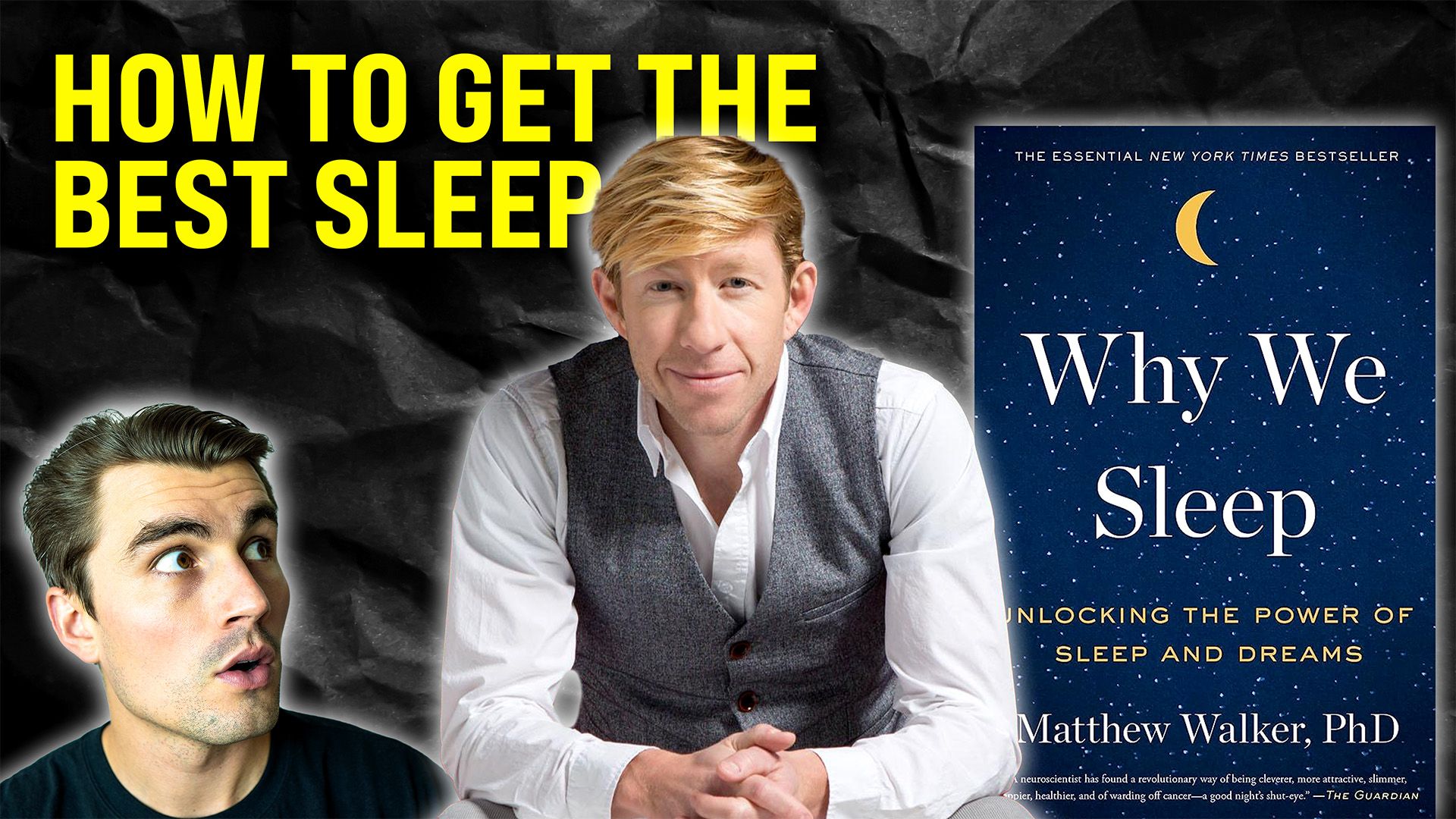The Power of Sleep: How Rest Influences Fat Loss and Muscle Growth

Few of us ever ponder on the profound impact sleep has on our overall health and fitness.
Because let’s face it, sleep is not nearly as sexy as the latest and greatest bicep blaster or new high protein lunch recipe. (Are those even sexy?)
Despite being an essential aspect of our daily lives, sleep is often overlooked, and something to be proud of foregoing.
Sleep is for the weak!
or
You can sleep when you’re dead!
Drawing inspiration from Matthew Walker's book "Why We Sleep: Unlocking the Power of Sleep and Dreams," let's dive into the intimate relationship between rest and physical well-being.
What is Sleep and Why is it Important?
At its core, sleep is a complex biological process where the body and brain undergo recovery, rejuvenation, and memory consolidation. Unlike a mere shutdown mode, it consists of multiple stages.
NREM (Non-Rapid Eye Movement)
Divided into three phases, NREM is responsible for body recovery, cellular regeneration, and memory consolidation.
REM (Rapid Eye Movement)
Known as the dreaming stage, REM plays a crucial role in emotional regulation, creativity, and problem-solving. For fitness enthusiasts, these stages are paramount. NREM aids muscle recovery and growth, while REM keeps our mental fitness sharp, assisting in staying motivated and focused on our goals.
The Price of Sleep Deprivation
In the hustle and bustle of modern life, burning the midnight oil has almost become a badge of honor. But it's crucial to understand that the cost of sleep deprivation, especially when we're on a journey to shed pounds, is exceedingly high.
Hormonal Havoc and Its Impact on Appetite
When our sleep is compromised, it triggers a domino effect in our hormonal balance, most notably affecting the hormones responsible for hunger and satiety: ghrelin and leptin. Ghrelin, often termed the 'hunger hormone,' increases, while leptin, the hormone that signals fullness, decreases. This imbalance can lead to an insatiable appetite, making you consume more calories than necessary. And here's the catch: sleep-deprived individuals often don't crave salads or proteins. Instead, there's a heightened attraction to high-carb, sugary, and fatty foods, further exacerbating weight gain.
Impaired Glucose Metabolism
Sleep deprivation doesn't just mess with hunger hormones; it also impacts how our body processes glucose. Studies have indicated that just a few nights of poor sleep can significantly reduce insulin sensitivity. With impaired insulin sensitivity, our body struggles to process glucose efficiently, storing it as fat rather than using it for energy. This scenario not only sets the stage for weight gain but also increases the risk of type 2 diabetes.
Reduced Fat Loss from Dieting
Here's an eye-opener: even if you're on a calorie-restricted diet, lack of sleep can direct your body to shed lean muscle mass over fat! When researchers studied dieters, they found that those who were sleep-deprived lost more muscle mass than fat, compared to those who slept adequately. This finding is crucial because muscle is metabolically active tissue that burns more calories even at rest. So, sleep deprivation can inadvertently decrease your calorie-burning capability.
Cognitive Impairments and Emotional Eating
The effects of sleep deprivation aren't merely physiological; they also manifest mentally. The lack of rest can cloud judgment, making it harder to resist temptations. Decision-making abilities are compromised, and the resolve to stick to a balanced diet wanes. Furthermore, fatigue and mood disturbances can make one susceptible to emotional eating. In a bid to feel better, one might turn to 'comfort foods,' which, more often than not, are calorie-laden and detrimental to fat loss goals.
Why Sleep is Crucial for Your Fitness
In our quest for a fitter, more robust body, we often lay emphasis on rigorous exercise and a meticulous diet. But there's a silent pillar that binds these efforts and amplifies their outcomes: Sleep. Let's delve deeper into why sleep is not just essential, but golden, for anyone on a fitness journey.
Improved Metabolism:
A rested body isn't just more energetic; it's also metabolically more active. When you sleep adequately, your body effectively regulates blood sugar and processes the food you eat. This efficiency means fewer calories stored as fat and more energy available for your daily activities and workouts. Over time, this optimally functioning metabolism can significantly aid in fat loss.
Muscle Recovery and Growth:
After a grueling workout, your muscles aren't immediately stronger. They undergo microscopic tears, and it's the recovery process that rebuilds them stronger than before. This recovery predominantly happens during deep sleep phases, where the body releases growth hormones. Skimping on sleep can reduce the efficacy of this recovery process, making your workouts less effective in terms of muscle gain.
Enhanced Motivation:
Anyone on a fitness journey knows the mental fortitude it demands. Motivation isn't just about starting; it's about persisting. Quality sleep plays a vital role here. REM sleep, known for its rich dream activity, has a significant role in emotional regulation. A well-rested mind is more resilient, less prone to mood swings, and more motivated to stick to fitness routines and dietary regimes.
Achieving the Best Sleep of Your Life
The quality of sleep is as essential as its quantity. So, how do we ensure we're not just sleeping, but sleeping well?
Consistent Sleep Schedule:
Our body loves predictability. By maintaining a consistent sleep schedule, we train our internal clock to follow a set rhythm. Over time, this helps in falling asleep faster and waking up more refreshed. Aim to maintain this schedule even on weekends to avoid the "social jetlag" effect.
Cool and Dark Environment:
Our sleep environment plays a pivotal role in determining sleep quality. Our body temperature drops slightly when we sleep, and a cooler room can aid this process. Darkness, on the other hand, triggers the release of melatonin – a crucial sleep hormone. Consider blackout curtains or a sleep mask to ensure minimal light intrusion.
Limit Screen Time:
In our digitally connected world, it's tempting to scroll through the phone or binge-watch shows before bedtime. However, the blue light emitted from screens can suppress melatonin production, making it harder to fall asleep. Aim to limit screen exposure at least an hour before bedtime.
Dietary Considerations:
What we eat affects how we sleep. Caffeine, for example, can stay in your system for up to 8 hours. Hence, that evening coffee might be the culprit behind your restless nights. On the other hand, foods rich in tryptophan (like turkey or bananas) or magnesium (like almonds) can promote sleep.
Physical Activity:
Physical activity, undoubtedly, aids in better sleep. A body tired from physical exertion naturally craves rest. However, timing is crucial. Rigorous activity boosts adrenaline and cortisol – hormones that can hamper sleep. Therefore, ensure there's a buffer of a few hours between your workout and bedtime.
Conclusion
For men striving to achieve fat loss or muscle gain, understanding the invaluable role of sleep is pivotal. The lessons from Matthew Walker's "Why We Sleep" aren't just about the act of sleeping, but about maximizing its quality and harnessing its power to support our fitness goals. By prioritizing rest, we set a strong foundation for not only physical transformation but also for a healthier, more vibrant life.
